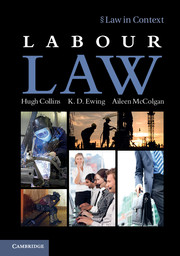Book contents
- Frontmatter
- Contents
- Preface
- Acknowledgments
- Table of cases
- Table of statutes
- Table of statutory instruments
- Table of European Union instruments
- Table of ILO instruments
- Table of other international instruments
- Abbreviations
- Part I Introduction
- Part II The contract of employment
- Part III Statutory regulation of the employment relationship
- 7 Wages
- 8 Working time
- 9 Equality
- 10 Work/life balance
- 11 Civil liberties at work
- Part IV Collective labour rights
- Part V Termination of employment
- Index
- References
10 - Work/life balance
from Part III - Statutory regulation of the employment relationship
- Frontmatter
- Contents
- Preface
- Acknowledgments
- Table of cases
- Table of statutes
- Table of statutory instruments
- Table of European Union instruments
- Table of ILO instruments
- Table of other international instruments
- Abbreviations
- Part I Introduction
- Part II The contract of employment
- Part III Statutory regulation of the employment relationship
- 7 Wages
- 8 Working time
- 9 Equality
- 10 Work/life balance
- 11 Civil liberties at work
- Part IV Collective labour rights
- Part V Termination of employment
- Index
- References
Summary
Most people need to work to earn an income on which to live. Once getting ready for and travelling to work are included, for most workers the bulk of the day will be occupied by the need to work. Yet most people have a biologically fuelled desire to start a family, which requires long periods of care for children. Within families we also incur moral responsibilities towards other members of the family, such as elderly parents or dependent siblings. These family responsibilities often add up in terms of time to the equivalent of a full-time job or more. Furthermore, these family responsibilities, such as the care of babies, are usually regarded as our most compelling moral duties, for which all other interests, including earning a living through work, will have to be sacrificed if necessary. The combination of demanding work and caring responsibilities often places extreme time pressure on employees. Although other demands on our time affect the balance we make between work and other aspects of living, the key issue for most people with regard to the work/life balance is the difficulty of managing the demands of work and family.
- Type
- Chapter
- Information
- Labour Law , pp. 370 - 407Publisher: Cambridge University PressPrint publication year: 2012



